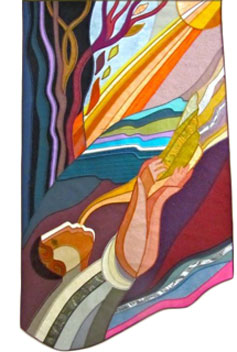History of the Congregation
Early History
 Since the Congregation’s early days in Pittsburg, California, the people of B’nai Shalom have been committed to a warm and caring community – for the religious, social, educational, and life-cycle needs of our members.
Since the Congregation’s early days in Pittsburg, California, the people of B’nai Shalom have been committed to a warm and caring community – for the religious, social, educational, and life-cycle needs of our members.
B’nai Shalom roots stretch back to 1948, when life began as Beth Israel Jewish Community Center in Pittsburg. Beth Israel grew from seeds established at Camp Stoneman by permanent military personnel and the Jewish Welfare Board of San Francisco to serve the needs of the Jewish service-men and -women passing through during World War II (Camp Stoneman was the principal personnel-processing facility for the Pacific Theatre of Operations; nearby Port Chicago was the principal munitions depot). By 1964, the Jewish population center had shifted, and Congregation B’nai Shalom was chartered in Walnut Creek by some of Beth Israel’s founders. Within two years, the Beth Israel assets and members were merged into B’nai Shalom.
The first service as a separate congregation was led by Cantor Theodore R. (Ted) Alexander on June 19, 1964. It was held at the Rancho San Miguel clubhouse. At the High Holy Days in 1964, congregants worshipped together for the first time as an official congregation, using torah scrolls borrowed from two Oakland congregations: Temple Beth Abraham and Beth Jacob Congregation. B’nai Shalom published its first fund raising book in 1964, beginning an annual tradition that continues to this day.
The first Selichot service in Contra Costa County was held September 18, 1965, the same month in which B’nai Shalom joined the United Synagogue of America, since renamed the United Synagogue of Conservative Judaism (USCJ). That same year saw the congregation’s first bar mitzvah,which was held at the Saranap Inn in Walnut Creek.
We acquired our first Torah in 1966 using Blue Chip stamps converted into cash. The Torah was dedicated at the Selichot service during the High Holy Days that year.
Clergy
In 1967, Cantor Alexander was succeeded by Cantor Jules Blackman, who conducted most of the Friday Night Shabbat services. That same year saw the beginning of the Men’s Club and our Sisterhood.
In 1968, Gordon M. Freeman became the new congregation’s first full-time rabbi. He guided B’nai Shalom through its growth, expansion, and new facilities in then-unincorporated Contra Costa County. After 38 years of leadership, Rabbi Freeman retired in 2007, and is now Rabbi Emeritus.
Cantor Marc A. Dinkin joined B’nai Shalom in 1991. He has been an endless source of thought-provoking and relevant commentaries on Torah and on Jewish thought and practice as he leads our services and teaches B’nai Mitzvah students as well as adult education classes. Hazzan Dinkin retired in 2014 and is now our Hazzan Emeritus.
Hazzan Sandy Bernstein joined the clergy team in July of 2021. She shares a love of Judaism and music with all with whom she engages. Ordained at the Academy for Jewish Religion California, Hazzan Bernstein holds a bachelor’s degree in music and is certified in early childhood education; she holds a master’s degree in Jewish Sacred Music with a specialization in Jewish education. She has concertized and led services throughout the US as well as in South America and Europe. Hazzan Bernstein has over 30 years of experience teaching in Jewish settings and directing choirs across generations.
Rabbi Daniel Stein became our spiritual leader in August of 2016. He is a creative spiritual leader who is committed to building dynamic, spiritually engaged communities. Ordained at the Jewish Theological Seminary, Rabbi Stein also completed a master’s degree in Jewish literature with a concentration in Yiddish there. Daniel is also an accomplished musician. He holds a degree in music history from the College-Conservatory of Music at the University of Cincinnati, and has performed professionally in wide variety of settings.
Today, Congregation B’nai Shalom is the only Conservative synagogue in Contra Costa County, with approximately 300 member households. We maintain our long-standing relationship with the United Synagogue of Conservative Judaism, with the Jewish Federation and Endowment Fund, with the Northern California Board of Rabbis, and with numerous multicultural and multiethnic organizations in the Walnut Creek area.